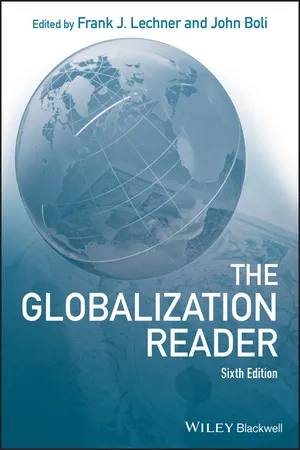
- English
- ePUB (mobile friendly)
- Available on iOS & Android
The Globalization Reader
About this book
An introduction to the issues surrounding the complex and controversial realities of today's interconnected world, the revised sixth edition
Since its initial publication, The Globalization Reader has been lauded for its comprehensive coverage of the issues surrounding globalization. Now in its sixth edition, the Reader has been thoroughly revised and updated and continues to review the most important global trends. Including readings by a variety of authors, the text offers a wide-ranging and authoritative introduction to the political, economic, cultural, and experiential aspects of globalization.
The updated sixth edition presents the most accessible and comprehensive review of current debates and research. Contributions from scholars, activists, and organizations provide balanced viewpoints and expert coverage of the many aspects of globalization. The Globalization Reader offers readings on an exciting range of new topics as well as retaining key globalization topics such as the experience of globalization, economic and political globalization, the role of media and religion in cultural globalization, women's rights, environmentalism, global civil society, and the alternative globalization movement. This important resource:
- Covers the many complex dimensions of globalization
- Includes contributions from many of the most prominent globalization scholars
- Presents concise and informative introductions to each major topic
- Offers compelling discussion questions for each section
- Contains readings on a variety of new topics such as migration, medical tourism, state policy regarding abortion and same-sex sexual relations, the UN Global Compact, climate justice, and more
Written for students in undergraduate and graduate courses in sociology, political science, anthropology and geography, the revised sixth edition covers courses such as globalization, comparative political economy, international relations and similar topics.
Tools to learn more effectively

Saving Books

Keyword Search

Annotating Text

Listen to it instead
Information
Part I
Debating Globalization
- Introduction
- 1 The Hidden Promise: Liberty Renewed John Micklethwait and Adrian Wooldridge
- 2 How to Judge Globalism Amartya Sen
- 3 The Elusive Concept of Globalisation Cees J. Hamelink
- 4 The Clash of Civilizations? Samuel P. Huntington
- 5 The Millennium Development Goals Report 2015 United Nations
- Part I Questions
Introduction
Note
- 1 Quoted in Timothy O’Brien, “He’s seen the enemy: It looks like him,” New York Times, December 6, 1998.
1
The Hidden Promise: Liberty Renewed
The need of a constantly expanding market for its products chases the bourgeoisie over the entire surface of the globe. It must nestle everywhere, settle everywhere, establish connections everywhere.The bourgeoisie has through its exploitation of the world market given a cosmopolitan character to production and consumption in every country. … In place of the old wants, satisfied by the production of the country, we find new wants, requiring for their satisfaction the products of distant land and climes. In place of the old local and national seclusion and self‐sufficiency, we have intercourse in every direction, universal interdependence of nations.
Table of contents
- Cover
- Table of Contents
- Preface to the Sixth Edition
- General Introduction
- Part I: Debating Globalization
- Part II: Explaining Globalization
- Part III: Experiencing Globalization
- Part IV: Globalization and the World Economy
- Part V: Globalization and the Nation‐State
- Part VI: Global Governance
- Part VII: Globalization, INGOs, and Civil Society
- Part VIII: Globalization and Media
- Part IX: Globalization and Religion
- Part X: Globalization and Identity
- Part XI: Global Environmentalism
- Part XII: Contesting Globalization: Alternatives and Opposition
- Index
- End User License Agreement
Frequently asked questions
- Essential is ideal for learners and professionals who enjoy exploring a wide range of subjects. Access the Essential Library with 800,000+ trusted titles and best-sellers across business, personal growth, and the humanities. Includes unlimited reading time and Standard Read Aloud voice.
- Complete: Perfect for advanced learners and researchers needing full, unrestricted access. Unlock 1.4M+ books across hundreds of subjects, including academic and specialized titles. The Complete Plan also includes advanced features like Premium Read Aloud and Research Assistant.
Please note we cannot support devices running on iOS 13 and Android 7 or earlier. Learn more about using the app